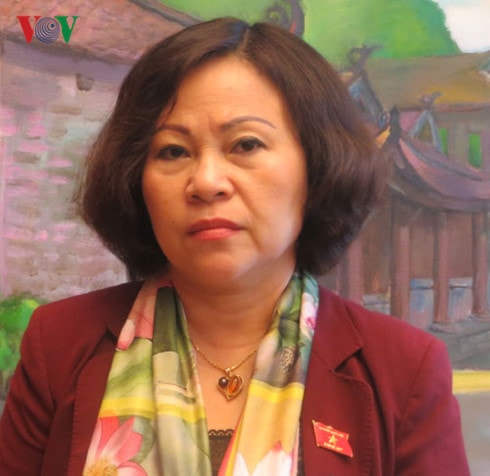Increasing tuition fees for non-public schools: Socializing education is going in the wrong direction
Socialization of education is not going in the right direction and does not guarantee the rights of learners.
According to the 2005 Law on Education and Decree 86 of the Prime Minister regulating the mechanism for collecting and managing tuition fees for educational institutions in the national education system, non-public schools, including both universities and high schools, are allowed to "self-determine tuition fees".
Therefore, the tuition fee of non-public schools is completely an agreement between the school and the parents. However, when the tuition fee that the school proposes to increase is not according to plan, without a roadmap, causing passiveness for parents, disagreements are happening, causing bad public opinion in society. As a result, students will be the ones who suffer the most if they have to transfer schools, change the learning environment, affecting the efforts and learning results of students.
What is of concern in the face of the above shortcomings is the authority of the Education sector in resolving the above issues. Because according to the Education Law, State management agencies do not have the authority to manage the revenue and expenditure of non-public schools. These schools operate under the Enterprise Law.
The local education sector only supervises enrollment targets and training programs, while only tax authorities have the right to supervise school finances.
 |
| Currently, tuition fees at non-public schools are entirely negotiated between the school and parents. Illustrative photo |
It is impossible to collect tuition fees as a mere business form.
Contributing to the control of tuition fees and education quality in non-public schools, Ms. Ngo Thi Minh, Vice Chairwoman of the National Assembly's Committee on Culture, Education, Youth and Children, stated her opinion:
Tuition fees cannot be considered as a source of revenue for a purely business form, but tuition feesFor non-public schools, it is necessary to balance the interests of investors, teachers, and managers, and clarify the state's support for learners through land policies, taxes, and credits that learners are entitled to...
Therefore, we need to clarify the State’s responsibility for non-public schools. To do this, the National Assembly needs to soon develop and promulgate the Law on Public-Private Partnership. Investors will increase their investment in non-public schools when they clearly see the strict regulations of the law in this field.
If we implement the socialization of education and non-public schools only consider collecting tuition fees from students, especially those at preschool level, it will be difficult to ensure feasibility, because their families will have to pay very high tuition fees so that investors can balance their financial spending.
Only when there is support in land, credit and tax from the state or the state clearly demonstrates its responsibility in this field can we hope to attract many investors to join hands to share the burden with the state, to ensure the rights of learners and the problem of the shortage of 30,000 public teachers at preschool level will have a satisfactory solution in the current conditions of streamlining the payroll.
Ms. Ngo Thi Minh said that the State needs to clearly demonstrate its responsibility so that the socialization of education can really go in the right direction, attracting a large number of investors to participate and join hands with the State to take care of the education cause. That is what many National Assembly deputies are looking forward to.
Need to clarify the type of school for profit or non-profit
Although the State has currently supported and created favorable conditions for some investors in terms of land and credit when developing high-quality non-public schools, the control of tuition fees for students, to ensure that they are commensurate with the quality of education and to update the compensation for state support for students through land and credit policies, etc., has not yet been clarified by the responsible agency.
 |
| Ms. Ngo Thi Minh, Vice Chairwoman of the National Assembly's Committee on Culture, Education, Youth and Children |
Therefore, the policy for non-public schools operating not for profit has not been applied. Therefore, it has not attracted investors, and has not attracted both teachers and students.
The phenomenon of some non-public schools charging excessively high tuition fees without quality control by authorities and unclear compensation of the state's responsibility has caused many parents to react strongly.
The Education sector has not yet taken measures to control tuition collection of non-public schools, has not clearly defined whether the school operates as for-profit or non-profit, and whether the tuition fee is commensurate with the quality that the school commits to and advertises or not needs to be clarified by the relevant sector to help the people...
In fact, there are currently a number of non-public schools that have announced their non-profit operations. These schools operate with sponsoring businesses, but the education sector does not have a specific mechanism to control revenue and expenditure, and investment in facilities for teaching and learning at the school.
According to Ms. Ngo Thi Minh, when the authorities grant licenses for non-public schools to establish and operate, these agencies must closely coordinate with the education sector in controlling investment projects and collecting tuition fees from students.
Accordingly, in the coming time, when building the Law on Public-Private Partnership, it is necessary to clearly define the responsibilities of enterprises, educational management agencies and the State's responsibilities in financial investment, and propose more appropriate tuition fees.
On the other hand, it is also necessary to clarify which schools operate for profit and which are non-profit, and to clarify the responsibility of state management agencies in managing non-public schools in general and high-quality non-public schools in particular on this issue.
To do so, when building the Law on Public-Private Partnership, it is necessary to proceed in the direction of ensuring that students in public and non-public schools receive equal attention from the State and State management agencies on education, making the socialization of education truly go in the right direction, for the benefit of teachers, learners, the State and investors./.
According to VOV
| RELATED NEWS |
|---|


